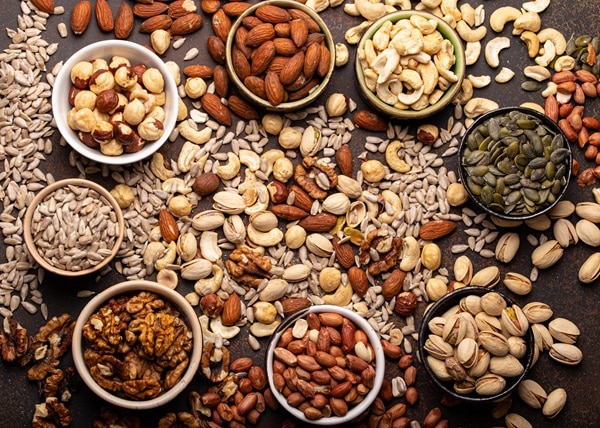In a world of dietary trends and nutrition myths, certain foods have stood the test of time and scientific scrutiny, emerging as non-negotiable staples for anyone serious about their health. These nutrient powerhouses are the darlings of health experts globally, and for good reason. Laden with vitamins, minerals, and various health-boosting compounds, they go beyond mere sustenance to offer protective and therapeutic health benefits. This article unveils these cherished foods, exploring why nutritionists revere them and how they can be seamlessly woven into one’s daily diet. Prepare to revamp your grocery list with foods that health experts can’t recommend enough.
Contents
- 1 Avocados: The Creamy Superfruit
- 2 Berries: Nature’s Antioxidant Jewels
- 3 Leafy Greens: The Vegetable Powerhouses
- 4 Broccoli: The Fiber-Filled Crusader
- 5 Quinoa: The Ancient Grain Reborn
- 6 Garlic: The Flavorful Immunity Booster
- 7 Nuts and Seeds: The Essential Fatty Acids Providers
- 8 Green Tea: The Hydrating Antioxidant Brew
- 9 The Bottom Line
Avocados: The Creamy Superfruit

Avocados have soared in popularity, earning their place as a staple in heart-healthy diets around the globe. Their rich, creamy texture is matched by a nutritional profile that’s just as rich, packed with monounsaturated fats, fiber, and an impressive array of vitamins and minerals. Not only do these fats help absorb other nutrients from plant foods, but they also maintain a healthy level of cholesterol in the body. This makes avocados a friend to cardiovascular health and a satisfying addition to any meal or snack due to their ability to promote satiety.
While some tout avocados for their fat content, it’s the quality of fat that stands out; oleic acid, a component of olive oil, is abundant in avocados, linking them to anti-inflammatory properties. Their versatility in the kitchen is unrivaled, easily incorporated into smoothies, salads, sandwiches, and even desserts. Health experts are quick to point out that despite their calorie density, the nutrient profile of avocados justifies their inclusion in a daily diet, contributing to overall nutrient intake and health.
Berries: Nature’s Antioxidant Jewels

Berries may be small, but their nutritional impact is mighty. These tiny fruits are bursting with vitamins, fiber, and, particularly, antioxidants, essential in fighting oxidative stress and inflammation in the body. Among the pantheon of berries, blueberries, strawberries, raspberries, and blackberries are lauded for their high antioxidant capacity, which is believed to play a role in reducing the risk of disease. Eating various berries is an enjoyable way to support cellular health and a functional immune system.
Moreover, incorporating berries into one’s diet is delightfully easy. They can be eaten raw, added to cereals, blended into a smoothie, or used to sweeten salads. Health experts emphasize that the natural fructose found in berries is preferable to added sugars, as they come with fiber and nutrients rather than empty calories. This makes berries an ideal sweet treat that contributes positively to one’s health.
Leafy Greens: The Vegetable Powerhouses

Nutritionists celebrate leafy greens like spinach, kale, and Swiss chard for their dense vitamin and mineral content. These vegetables are low in calories yet high in fiber, vitamins A, C, E, and K, and minerals like iron and calcium. Greens have the unique ability to support a variety of bodily functions, including vision, blood clotting, and the immune system. They’re also involved in bone health and provide the necessary nutrients for a well-functioning nervous system.
The benefits of leafy greens extend to their potential role in chronic disease prevention. Their nutrient makeup supports cardiovascular health and may contribute to the prevention of certain types of cancers. Integrating these greens into the diet can be as simple as tossing a handful into a smoothie or sautéing them as a side dish. The collective voice of health experts echoes the sentiment that the daily inclusion of leafy greens can significantly contribute to overall health and well-being.
Broccoli: The Fiber-Filled Crusader

This cruciferous vegetable has long been a poster child for healthy eating, and with good reason. Broccoli is not only a fiber powerhouse, but it’s also laden with vitamins C and K, a variety of B vitamins, potassium, and iron. This rich nutrient profile supports digestive health, immune function, and bone health. Moreover, broccoli contains sulforaphane, a compound with potential anti-cancer properties, making it a regular feature in health experts’ recommendations.
Beyond its health benefits, broccoli is incredibly versatile in the kitchen. It can be enjoyed raw, steamed, roasted, or stir-fried, allowing it to fit into various cuisines and dietary preferences. While some nutrients are heat-sensitive, health experts advocate for a mix of raw and cooked broccoli in meals to maximize its health benefits, ensuring that individuals can take full advantage of what this vegetable has to offer.
Quinoa: The Ancient Grain Reborn

The reputation of quinoa has surged in recent times, reclaiming its ancient glory as a nutritional goldmine. This grain is a rare plant source of complete protein, boasting all nine essential amino acids. It’s also rich in fiber, B vitamins, iron, potassium, calcium, phosphorus, vitamin E, and various beneficial antioxidants. Health experts often spotlight quinoa as an excellent dietary staple for anyone looking to enhance their protein intake without consuming meat and other animal products.
Quinoa’s versatility also contributes to its acclaim. It can be used as a base for salads, as a rice substitute, or even as a breakfast porridge. Its nutty flavor and ease of cooking make it a favorite among those who prioritize health without compromising taste. The ability of quinoa to serve as a functional food that fits into a multitude of dietary patterns underscores why health professionals sing its praises.
Garlic: The Flavorful Immunity Booster

Garlic, the pungent staple of culinary arts, is equally potent in its health benefits. Known for its active compound allicin, garlic has been used for its medicinal properties for centuries. Today, health experts endorse garlic’s ability to boost the immune system and support heart health. Regular consumption of garlic has been associated with blood pressure regulation and cholesterol level improvements, which are critical factors in cardiovascular disease prevention.
Despite its strong aroma, garlic is a ubiquitous ingredient that enhances flavor profiles in dishes worldwide. From sautés to soups and sauces, garlic is an indispensable addition to both the kitchen and a healthful diet. Its widespread availability and potent health properties make it a favorite recommendation among nutritionists and health enthusiasts. Garlic’s benefits are most potent when it’s fresh and crushed or chopped, which activates its beneficial compounds.
Nuts and Seeds: The Essential Fatty Acids Providers

Health experts treasure nuts and seeds for healthy fats, including omega-3 and omega-6 fatty acids, protein, fiber, and essential nutrients. These small but mighty food items have been shown to play a significant role in promoting heart health and aiding in weight management. Their satiating properties can help curb appetite, making them a smart choice for snacks and meal additions.
The diversity among nuts and seeds is vast, with each variety offering its unique blend of nutrients. Almonds, walnuts, flaxseeds, and chia seeds, for example, are particularly high in nutrients that benefit brain health and energy levels. They can be sprinkled over salads, blended into smoothies, or enjoyed independently. Health experts encourage a moderate intake, given their high-calorie content, to harness the benefits without excess energy intake.
Green Tea: The Hydrating Antioxidant Brew

Green tea is another beverage that receives high marks from health professionals. It is loaded with catechins, an antioxidant linked to various health benefits, including improved metabolism and a lower risk of certain diseases. Green tea also contributes to hydration, essential for every bodily function, and contains compounds that may aid in weight management.
This ancient brew is not just for those with a palate for the traditional; it’s a versatile drink that can be enjoyed hot or cold and even incorporated into recipes. With its subtle flavor and health-enhancing properties, green tea is an excellent substitute for sugary drinks, providing a calorie-free hydration option that can support overall health. Whether sipped in the morning or enjoyed throughout the day, green tea is a beverage that health experts can’t recommend enough for maintaining hydration and boosting antioxidant intake.
The Bottom Line
As we’ve journeyed through various foods that have garnered the stamp of approval from health experts worldwide, it’s clear that a pattern emerges: nutrient density is key. Avocados, berries, leafy greens, broccoli, quinoa, garlic, nuts and seeds, and green tea each offer unique benefits that can contribute to a balanced and healthful diet. Incorporating these foods into daily meals can provide many health benefits, from improved heart health to enhanced immune function and beyond. While this list is not exhaustive, it provides a foundation upon which a health-promoting diet can be built. The power of food is immense, and with the guidance of health experts, harnessing this power for better health is an achievable goal for all.


